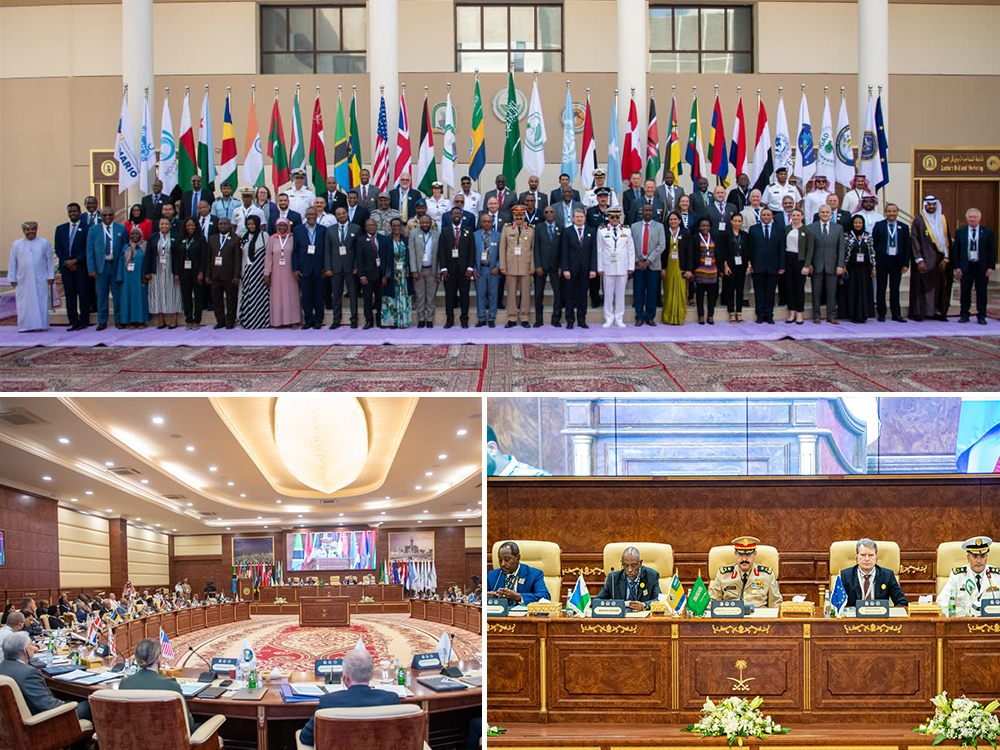Signatory States to the revised Code of Conduct concerning the repression of piracy, armed robbery against ships and illicit maritime activity in the western Indian Ocean and the Gulf of Aden Area, also known as the Jeddah Amendment to the Djibouti Code of Conduct (DCoC) 2017, have agreed the next steps to enhance implementation of the amended code.
A high-level meeting, held in Jeddah, Kingdom of Saudi Arabia (22-24 November), agreed practical measures for the implementation of an improved, region-led Information Sharing Network to meet the objectives of the Jeddah Amendment; the effective use of the regional Capacity Building Coordination Matrix, based on signatory States' needs and priorities; and a more effective support network of regional and international partners that make up the "Friends of the DCoC/JA".
Following extensive discussions, the meeting adopted two resolutions. Resolution 1 on "Enhancement of the DCOC/JA information sharing network" adopted new mission and vision statements for the DCoC Information Sharing Workshop and gave clear direction on the way forward with respect to development of national maritime information sharing centres, the information to be shared, general considerations and goals. Resolution 2 on "Responding to evolving maritime challenges and security priorities of Signatory States to the Jeddah Amendment to the Djibouti Code of Conduct, 2017" related to maritime security in the wider context of supporting Signatory States' maritime development and meeting sustainable development goals.
"Maritime security is in all our interest, but it can be maintained only when based on cooperation. No single state can do it alone," noted European Union Ambassador Michael Pulch.
"Information sharing is vital in dealing with security threats at sea. The Jeddah Amendment provides a good framework of cooperation with regional States in dealing with all manner of illicit activities at sea," said His Excellency Hassan Houmed Ibrahim, Minister of Infrastructure and Equipment, Djibouti.
The meeting was jointly organized by IMO and the Kingdom of Saudi Arabia, with financial and in-kind contributions from the Kingdom of Saudi Arabia.
The Jeddah meeting was opened by Major General Muhammad Abdullah Al-Shehri, Director General of the Border Guard of the Kingdom of Saudi Arabia, His Excellency Hassan Houmed Ibrahim, Minister of Infrastructure and Equipment, Republic of Djibouti and His Excellency. Ambassador Michael Pulch, Senior Coordinator, Coordinated Maritime Presence, North-Western Indian Ocean (European Union). IMO Secretary-General Kitack Lim gave a video message.
The meeting was attended by more than 80 participants representing 17 signatory States[1] and over 30 observers[2] attending as Friends of the DCoC/JA.
Major General Al-Shehri Chaired the meeting. Mrs. Nancy Karigithu, Principal Secretary for Shipping and Maritime Affairs, Kenya, was co-chair.
The closing ceremony was officiated by: His Excellency Mohamed Abdulkadir, State Minister of Ports and Marine Transport, Somalia; His Excellency Hassan Houmed Ibrahim, Minister of Infrastructure and Equipment, Djibouti; His Excellency Ranjatoelina Rolland Fidiariseheno, Madagascar Minister of Transport and Meteorology Madagascar; and Mr. Sharew Yehwalashet Jemere, Director General, Ethiopian Maritime Authority. In his closing remarks, Major General Muhammed Al-Shehri, congratulated the participants for the excellent outcomes and thanked IMO for the unwavering support.
[1] Comoros, Djibouti, Ethiopia, Jordan, Kenya, Maldives, Mauritius, Madagascar, Mozambique, Oman, Saudi Arabia, Seychelles, Somalia, South Africa, Sudan, U.R Tanzania, and Yemen
[2] Denmark, India, Netherlands, UK, USA, Combined Maritime Forces, (CMF), EU CRIMARIO, European Union (EU), EU NAVAL FORCE SOMALIA (OP ATALANTA) (EU NAVFOR), EUCAP – SOMALIA, IGAD, Indian Ocean Commission, (IOC), INTERPOL, INTERPORTPOLICE, UKMTO and UN SOMALIA.
